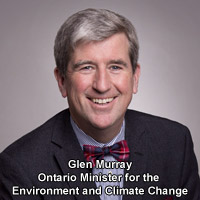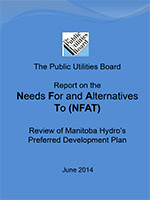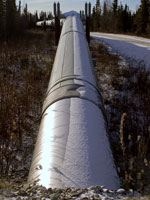
News |
- Glen Murray Now Ontario Environment & Climate Change Minister
- Killing Libraries Kills Democracy: Libricide
- Public Utilities Boards Says NO to Manitoba Hydro Plan
- Lake Winnipeg Regulation Resolution from Manitoba Chiefs
- Canadian Supreme Court Recognizes First Nation Land Title
- Manitoba Surface Water Plan Out For Comments
- Manitoba's Blue Mosaic
- Desmond Tutu: 'Tar Sands Filth Is Negligent And Irresponsible'
- Oil Is Out Of Time
- Open Doors To Electric Vehicle Technology
- President Obama's Climate Action Plan
- 300 Scientists To Harper: Northern Gateway Flawed
| Glen Murray Now Ontario Environment & Climate Change Minister | 7 July 14 |

Putting a price on carbon is the most economically efficient way to reduce emissions and has been recommended by groups as diverse as National Round Table on Environment and Economy and, Organisation for Economic Co-operation and Development. It would also allow for reducing the tax burden on other areas such as income, something businesses and individuals alike would welcome. Glen Murray is former Mayor of Winnipeg. He was elected to the Legislative Assembly of Ontario as Member of Provincial Parliament (MPP) for Toronto Centre in 2010. In August 2010, he was appointed to the provincial cabinet as Minister of Research and Innovation. Murray was re-elected in October 2011, and appointed Minister of Training, Colleges and Universities. He resigned from cabinet on November 3, 2012 in order to run as a candidate in the 2013 Ontario Liberal Party leadership election. Glen Murray became Ontario Minister of Transportation and Minister of Infrastructure on February 11, 2013 for the Liberal Party of Ontario.
View July 3, 2014 Environmental Law and Litigation article |
|
 Print version Print version |
Top |
| Killing Libraries Kills Democracy: Libricide | 7 July 14 |

Source: Boing Boing
The Harper government has, since 2006, moved to control and prevent free flow of scientific information in Canada, particularly when that information reflects undesirable consequences from industrial development. Many in the scientific community in Canada have compared the destruction of the Department of Fisheries and Oceans (DFO) research libraries across Canada and the attacks on environmental scientists to the book burnings of 1930s Nazi Germany. Dalhousie University biologist Jeff Hutchings calls the closures "an assault on civil society."
View January 29, 2014 The Argus article |
|
 Print version Print version |
Top |
| Public Utilities Boards Says NO to Manitoba Hydro Plan | 7 July 14 |

The PUB recommendations (pg 249 of the report) start with a clear recommendation that the Manitoba government not approve Manitoba Hydro's proposed preferred Development Plan." Acknowledging the in service date for the Keeyask Generation Station is perhaps 5 years early based on domestic energy need within Manitoba, the PUB recommends that "Manitoba Hydro proceed with the construction of the Keeyask Project to achieve a 2019 in service date." Despite there already being 4 transmission interconnections between Manitoba and the United States customers for Manitoba Hydro, the PUB recommended that "the Manitoba government authorize Manitoba Hydro to proceed with the 750 MW US transmission interconnection project for 2020 in service date." About the Conawapa Generation Station, the PUB recommended that the government of Manitoba not approve construction of the Conawapa Project and the North South Transmission Project. The PUB stated, ‘nor should existing sunk costs become a justification for Conawapa." Rate-payer impacts are subject of another 3 PUB recommendations to government. In its closing the PUB report indicates it is "now time for to determine and build a more diversified (energy) resource portfolio" Solar and wind energy should be an integrated part of the future of Manitoba's energy portfolio, according to the PUB report.
View June 2014 Public Utilities Board NFAT Report |
|
 Print version Print version |
Top |
| Lake Winnipeg Regulation Resolution from Manitoba Chiefs | 27 June 14 |

To date no permanent licence or permit is in place for regulation of Lake Winnipeg, or operation of JenPeg. The same is true for other infrastructure in the Manitoba Hydro system. No environment licence for regulation of the Lake is in place currently, or anticipated as a result of the hearings. The CEC will be guided for the hearings by the reference from Minister Mackintosh, which is posted on their website. Their recommendations will pertain to regulation of Lake Winnipeg under the Water Power Act. The Assembly of Manitoba Chiefs resolution shows concern for the delay since 2011, and the urgent need for a transparent and thorough review after forty years regulation of Lake Winnipeg, and expects attention to the rights of many First Nations affected by regulation of the Lake. The Chiefs state: "the Assembly of Manitoba Chiefs expect Premier Selinger and Minister Mackintosh to make sure that full public hearings, with participant funding, independent experts and access to information regarding 40 years of regulation of Lake Winnipeg to be available to all parties, be conducted for regulation of Lake Winnipeg, and regulation of Jenpeg." The Chiefs further state:" Executive Council (cabinet), Manitoba Hydro, and the Premier and Minister Mackintosh must be reminded and advised that Aboriginal constitutional rights, inherent, treaty, and agreements with the Crowns and the utility must be upheld through the stages of review, analysis, and CEC proceedings and hearings." To date there are no details of the CEC's process for hearings, identifying participants, or participant funding. There will be a CEC tour of communities affected by the regulation of the Lake, held prior to the Winnipeg hearings. The AMC resolution link is provided below.
View Manitoba Clean Environment Commission Lake Winnipeg Regulation -- Manitoba Hydro page |
|
 Print version Print version |
Top |
| Canadian Supreme Court Recognizes First Nation Land Title | 27 June 14 |

Source: CBC
The unanimous 8-0 decision released Thursday resolves many important legal questions, such as how to determine aboriginal title and whether provincial laws apply to those lands. The decision, written by Chief Justice Beverley McLachlin, also has implications for future economic or resource development on First Nations lands. "British Columbia breached its duty to consult owed to the Tsilhqot'in through its land use planning and forestry authorizations," the 81-page decision states. Grand Chief Stewart Phillip, president of the Union of B.C. Indian Chiefs, was with Chief Roger William, who brought the case, and other Tsilhqot'in chiefs when they learned of the top court's decision, and said the mood in the room was "absolutely electrifying." "We all heard the decision at the same moment, and the room just erupted in cheers and tears. Everybody is absolutely jubilant. It's very emotional," Phillip told CBC News. "It only took 150 years, but we look forward to a much brighter future. This, without question, will establish a solid platform for genuine reconciliation to take place in British Columbia." "I didn't think it would be so definitive," Phillip added. "I was actually prepared for something much less. It's not very often that I'm without words, and I'm quite overwhelmed at the moment." The decision rejected the narrow view of what qualified for protection under aboriginal rights from a 2012 ruling by the B.C. Court of Appeal. While the lower court had said aboriginal groups must be able to prove intensive historical use of a specific site, Thursday's decision accepts a broader set of criteria particularly important for the Tsilhqot'in, a historically "semi-nomadic" people. Indigenous groups must now prove a looser definition of occupation, continuity of habitation on the land, and exclusivity in an area in order to be granted a title. The Supreme Court of Canada currently has other similar cases to rule on, with the June 26th decision as a precedent. Analysis is beginning as to how this decision affects both provincial and federal governments and First Nations across Canada.
View June 26, 2014 CBC News article |
|
 Print version Print version |
Top |
| Manitoba Surface Water Plan Out For Comments | 27 June 14 |

"Manitoba faces three water woes: excessive nutrient loading of waterways that is harming Lake Winnipeg, damage from flooding and the risk of drought," said Minister Mackintosh. "All three can be mitigated with a new, sustainable approach to managing drainage and investing in flood control infrastructure." About 75 per cent of original wetlands in Manitoba have been drained since industrial development began on the prairies, much of that in areas such as the Red River basin, impairing the natural ability of waterways to retain, release and refresh water over time, Minister Mackintosh said, adding this strategy seeks to end further loss of the benefits that wetlands provide and includes a plan to overhaul drainage licensing that would streamline approvals for routine drainage while protecting seasonal wetlands. Public comments are being requested until December 31, 2014, through the government web site.
View Manitoba's Surface Water Management Strategy |
|
 Print version Print version |
Top |
| Manitoba's Blue Mosaic | 27 June 14 |

The report, Manitoba's Blue Mosaic, ranks the province's water and wetlands as among the most ecologically significant in the world. It says Manitoba is one of the few jurisdictions where large-scale conservation of those resources remains possible. "Manitoba is really special among Canadian provinces. Although people think of it as a prairie province, it has one of the largest boreal forest areas in Canada, and one of the most intact boreal forest ecosystems," said Jeff Wells , science and policy director with the Boreal Songbird Initiative and a co-author of the report. "And it is all interconnected via water. The Manitoba boreal is dense with wetlands—rivers, lakes, ponds, bogs, marshes, and peatlands—that support a vast amount of wildlife and provide incredible services to the environment. It's just this massive living system," Wells said. Manitoba's Blue Mosaic details how water is the thread connecting Manitobans to a boreal realm that—at 570,000 square kilometres (140 million acres)—is daunting in scale.
View June 2014 Ducks Unlimited and Boreal Songbird Initiative report |
|
 Print version Print version |
Top |
| Desmond Tutu: 'Tar Sands Filth Is Negligent And Irresponsible' | 13 June 14 |

"The fact that this filth is being created now, when the link between carbon emissions and global warming is so obvious, reflects negligence and greed," said Tutu, a Nobel Prize winner and widely respected human rights advocate. Archbishop Tutu was the main attraction this weekend at a Fort McMurray conference focused on treaty rights and the environment, and spoke to a room of about 200, including First Nations members from across the Prairies and Northwest Territories – many of whom spoke about their struggles their loss of traditional territory and concerns about safe drinking water due to energy projects. The renowned human right crusader was in Fort McMurray to attend the As Long As the Rivers Flow conference, sponsored by Toronto law firm Olthuis Kleer Townshend LLP and the Athabasca Chipewyan.
View June 3, 2014 Edmonton Journal article |
|
 Print version Print version |
Top |
| Oil Is Out Of Time | 13 June 14 |

Over the last decade, rising oil prices have been driven primarily by rising production costs. After the release of the IEA's World Energy Outlook last November, Deutsche Bank's former head of energy research Mark Lewis noted that massive levels of investment have corresponded to an ever declining rate of oil supply increase: "Over the past decade, the oil and gas industry's upstream investments have registered an astronomical increase, but these ever higher levels of capital expenditure have yielded ever smaller increases in the global oil supply. Even these have only been made possible by record high oil prices. This should be a reality check for those now hyping a new age of global oil abundance."
View June 10, 2014 The Guardian article |
|
 Print version Print version |
Top |
| Open Doors To Electric Vehicle Technology | 13 June 14 |

"If we clear a path to the creation of compelling electric vehicles, but then lay intellectual property landmines behind us to inhibit others, we are acting in a manner contrary to that goal," Musk wrote in a blog on the company's website. At the start of 2014, Tesla had been issued 203 patents covering its batteries and other key features that distinguish its electric cars from gasoline-powered vehicles. Another 280 patent applications are still pending in the US and other countries, according to Tesla's regulatory filings.
View June 13, 2014 The Guardian article |
|
 Print version Print version |
Top |
| President Obama's Climate Action Plan | 6 June 14 |

The Obama administration unveiled historic environment rules cutting carbon pollution from power plants by 30% on Monday, spurring prospects for a global deal to end climate change but setting up an epic battle over the environment in this year's mid-term elections. The new rules, formally announced by the Environmental Protection Agency, represent the first time Barack Obama, or any other president, has moved to regulate carbon pollution from power plants – the largest single source of carbon dioxide emissions that cause climate change. The EPA said the regulations, which would cut carbon pollution from power plants 30% from 2005 levels by 2030, would "fight climate change while supplying America with reliable and affordable power". The EPA administrator, Gina McCarthy, said the new rules would be critical to Obama's efforts to deliver on his promise – to Americans and the international community – to fight climate change. "The EPA is delivering on a vital piece of President Obama's climate action plan by proposing a clean power plan that will cut harmful carbon pollution from our largest source – power plants," she said in a statement.
View The President's Climate Action Plan |
|
 Print version Print version |
Top |
| 300 Scientists To Harper: Northern Gateway Flawed | 6 June 14 |

The letter sent to Prime Minister Stephen Harper and several key cabinet ministers said the report by the joint review panel is "indefensible as a basis to judge in favour of the project." It was signed by 300 scientists from universities from Newfoundland to Vancouver Island, along with colleagues from international institutions including Stanford, Cornell and Oxford. "There have been references to the review being science-based," said Eric Taylor, a University of British Columbia zoology professor and letter co-author. "We thought we should test that assumption by looking at the joint review panel report almost as we would a scientific publication, to see if it was rigorous." Kai Chan, a University of British Columbia associate professor who helped pen the letter, calls the report a failure. "The consideration of how the benefits outweigh the costs and risks was really given almost no space and no logic. It's absolutely insufficient as a basis to make a decision as to whether the project is in the public interest," says Chan.
View June 5, 2014 CBC News article |
|
 Print version Print version |
Top |


 RSS Feeds:
RSS Feeds: